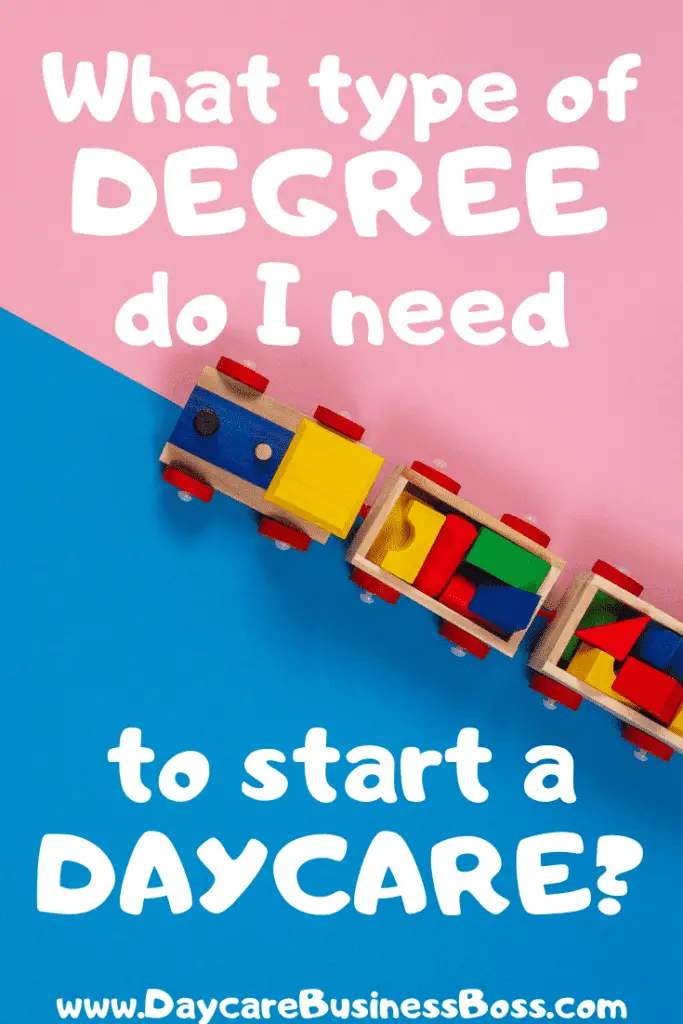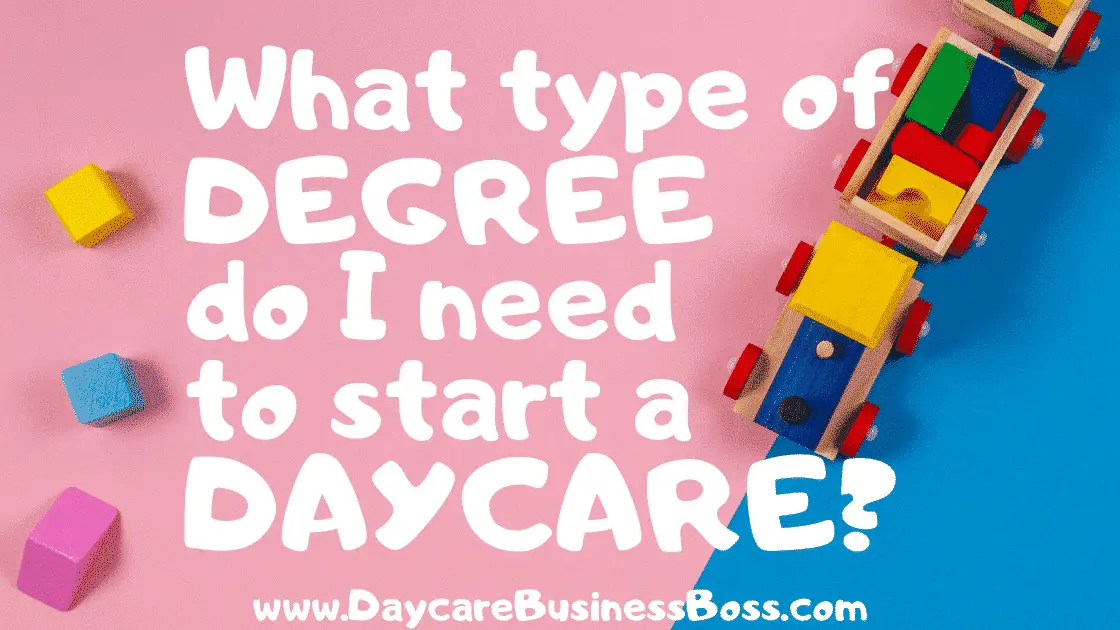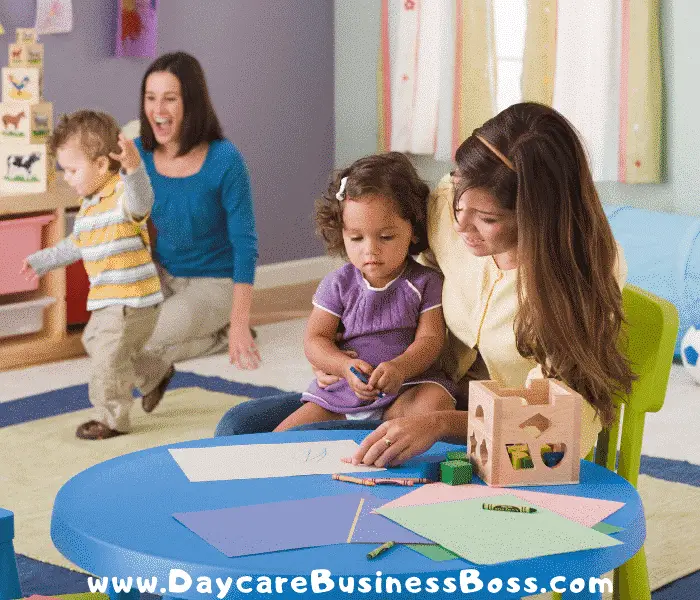Starting a daycare requires a specific set of qualifications, as well as a considerable time commitment. Obtaining the appropriate educational background is an important step in starting a daycare. Some states require a particular number of semester units in certain fields to be a qualified staff member at a child care center.
To start a daycare, one should obtain an early childhood education degree. This is available through various programs and colleges, including online courses. One can gain valuable insight and information by acquiring this degree, as well as critical skills necessary to start and maintain a daycare.
Degree Programs
There are numerous programs that one can enroll in to obtain an early childhood education degree. They range from online associate’s degrees to on-campus doctoral programs. Regarding time commitment, one can expect to complete an online master’s in one to three years, as most programs generally consist of 30 to 38 credits. According to US News & World Report, students pursuing a master’s degree in this field should expect to spend between $11,000 and $24,000 for tuition.
However, a master’s degree may not be necessary in all cases, as less than half of all child care center directors hold a master’s degree. While having additional educational background may give one an advantage, typical entry-level education for this line of work is a bachelor’s degree. Some that wish to start or direct a daycare may also opt to have a nationally recognized credential, such as the Child Development Associate (CDA) Credential, which is the most widely recognized credential in early childhood education. Considered to be a key stepping stone on the path of career advancement in early childhood education, the CDA Credential is based on a core set of competency standards, which guide early care professionals as they work toward becoming qualified teachers of young children.
There are different types of degree programs that vary in time commitment and course content. Certificate programs offer a foundation in early childhood education and some curriculum and instruction. Associate’s programs allow students to learn childhood growth and development, best practices, and about the role of educators. Bachelor’s programs, which are the most common in this field, have a curriculum that includes administration for early childhood programs, literacy, instruction, and psychology. Master’s programs have courses that include law and ethics in education, leadership, finance, and organizational design. Lastly, Ph.D. programs contain studies in research methods in education, childhood development theory, curriculum planning, and literacy development.
Some rankings list Vanderbilt University as having the best program for early childhood education, which includes direct experience working with children. Others, however, list the University of Georgia at the top, as their program also includes some practical experience. A student’s last semester is spent as a full-time student teacher, working collaboratively with mentor teachers. The degree program at UGA also emphasizes fostering successful relationships with children and parents. This type of experience would be greatly beneficial to anyone interested in starting a daycare. Other schools with great early childhood education degree programs include New York University, the University of North Carolina at Chapel Hill, and the University of Illinois at Urbana-Champaign. It is important to note that some of these schools also require students who major in early childhood education to choose a second major. This ensures that their degree fits their academic interests and focuses on a chosen subfield or topic in education.
Coursework
While coursework can vary depending on one’s choice of school, there are a set of foundational courses that are common among most institutions. Some schools offer licensure upon graduation and work hard to prepare students through direct experience. Most universities require students first complete a core set of studies that include communication, mathematics, history, humanities, and natural sciences. These courses are designed to give students a well-rounded foundation in multiple disciplines.
Regarding coursework more specific to an early childhood education degree, students must complete courses on various topics, ranging from literacy to leadership. Focusing on such a wide range of topics prepares students for work in the field. Emergent literacy courses allow students to learn about the development and facilitation of literacy from birth. It is important for those starting a daycare to have an understanding of developmental patterns, as well as how to foster literacy for children from diverse backgrounds.
Many university programs offer courses on relationships in early childhood, school, and clinical environments. Students also learn about instructional practices and assessments through developmental screenings. Ensuring a safe and productive learning environment for children is a key part of running a daycare. Classes focusing on teaching and providing care to children from diverse backgrounds and ages are crucial to success at child care centers. Because those who work in daycares must be accommodating and mindful of children with disabilities, many schools require students to take a course in child development and disability. These classes focus on childhood development and are affected by sensory, motor, cognitive, and/or affective impairments. Those interested in starting a daycare must also learn leadership, advocacy, and coaching strategies for implementing change, which is why some university programs have teacher leadership courses.
Further, many on-campus programs offer or require students to complete an internship or comparable supervised work in the field. Many are community-based and involve working at local daycare centers or elementary schools. The length of this varies, with some schools requiring as little as 3 hours, or as much as 60 hours. This valuable experience allows students to be prepared for the type of work they will be doing after graduation. It also provides them with mentors and helps them develop relationships with other people involved in early childhood education.
Qualifications
There are additional qualifications required to start a daycare, many of which are bolstered by the required educational experience. Some states and child care centers require a number of credits or semesters studying a particular topic. These topics can range from infant care to administration or staff relations. Specific requirements often depend on the position one is pursuing or the type of daycare one wants to start.
Because it is often difficult to convey the realities of running a daycare in a classroom setting at a university, direct experience is vital. This is why many schools offer it for credit as part of their curriculum. In some states, there are work experience requirements in order to become a child care center director or to start one.
Critical skills necessary to start a daycare include business, communication, interpersonal, leadership, and organizational skills. Further, relevant work experience is also beneficial. Thus, working for several years in early childhood education would allow one to gain the necessary knowledge and skills to start their own daycare.
In addition to educational background, there are certifications, licenses, and registrations that one should be mindful of when starting a daycare. There are background checks, minimum training requirements, staff certifications, and other standards that must be met. To find the relevant requirements, one should contact their state’s Department of Social Services.
Many of the educational and certification requirements necessary to start or direct a daycare overlap with those needed to become a preschool, kindergarten, or elementary school teacher. Some choose to begin their careers in a school setting to gain experience and then transition to daycares, and vice versa. Because of this, there are a vast number of opportunities available to those who pursue a degree in early childhood education. While obtaining a degree requires a considerable amount of hard work and a significant time commitment, it is a critical first step in order to start a daycare. Starting a daycare and looking after children is also a notable profession, as early childhood education is important for development.
Related Questions
What is the expected job outlook for people with early childhood education degrees?
The Bureau of Labor Statistics projects that the employment of child care directors will grow 11% by 2026. Because the number of children under age 5 is expected to increase, a greater number of working parents will need the assistance of daycares. Many also recognize the importance of early childhood education for a child’s emotional and intellectual development.
What is the median salary for those with a degree in early childhood education?
Those who successfully complete an early childhood education degree program, and go on to either start or direct a child care center can expect to make about $47,940 per year, according to the Bureau of Labor Statistics. More specifically, the median salary for those in child daycare services was $46,310 in 2018.
What are the next steps after obtaining a degree?
After obtaining the appropriate degree, one must become licensed through their state’s Department of Social Services. This process will likely include orientations, inspections, investigations, consultations, and educational and technical support. Choosing and establishing a business entity is also an important step in starting a daycare. Additionally, one must also adhere to their state’s health, safety, and employment guidelines.
Please note: This blog post is for educational purposes only and does not constitute legal advice. Please consult a legal expert to address your specific needs.
Start your daycare business on the right foot. Use our startup documents to help you on the way!


Meet Shawn Chun: Entrepreneur and Childcare Business Fan.
I’m a happy individual who happens to be an entrepreneur. I have owned several types of businesses in my life from a coffee shop to an import and export business to an online review business plus a few more and now I create online daycare business resources for those interested in starting new ventures. It’s demanding work but I love it. I do it for those passionate about their business and their goals. That’s why when I meet a childcare business owner, I see myself. I know how hard the struggle is to retain clients, find good employees and keep the business growing all while trying to stay competitive.
That’s why I created Daycare Business Boss: I want to help childcare business owners like you build a thriving business that brings you endless joy and supports your ideal lifestyle.





3 thoughts on “What Type of Degree Do I Need to Start a Daycare?”
Comments are closed.